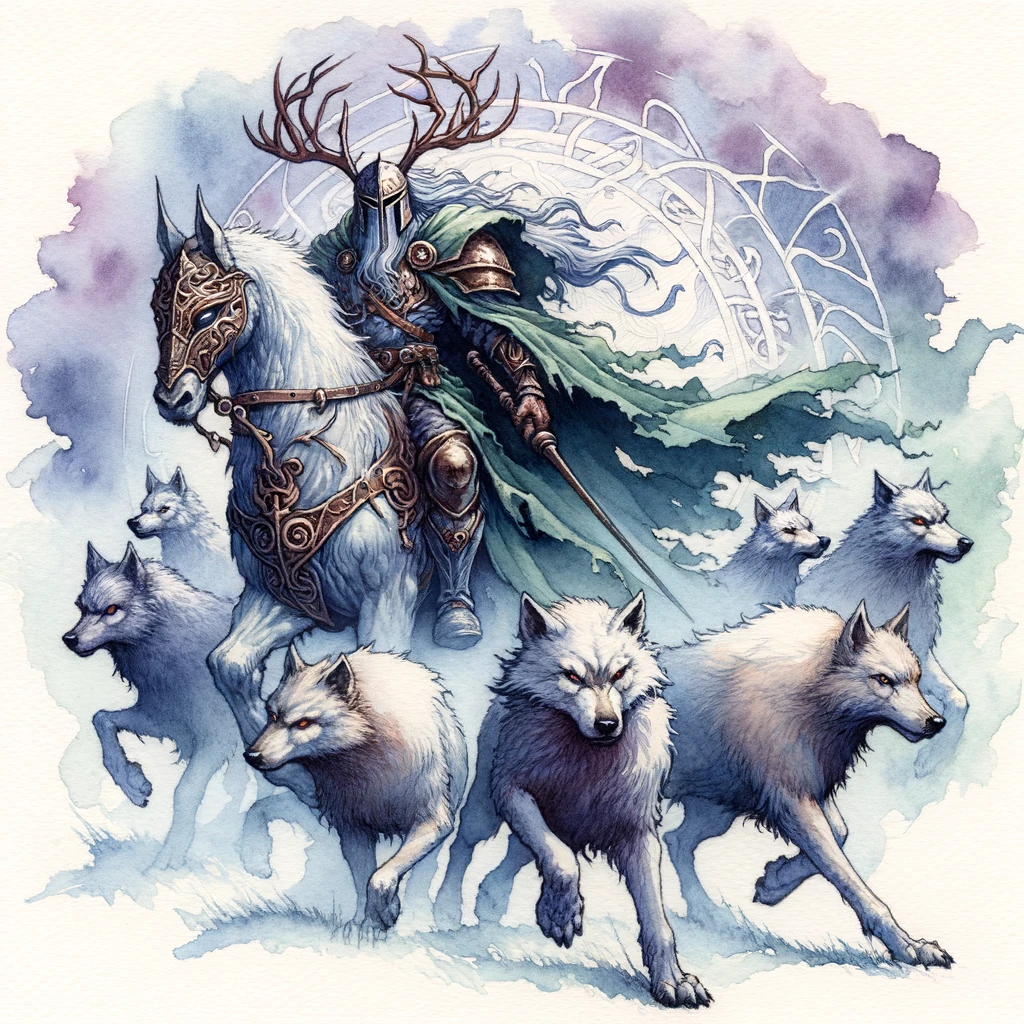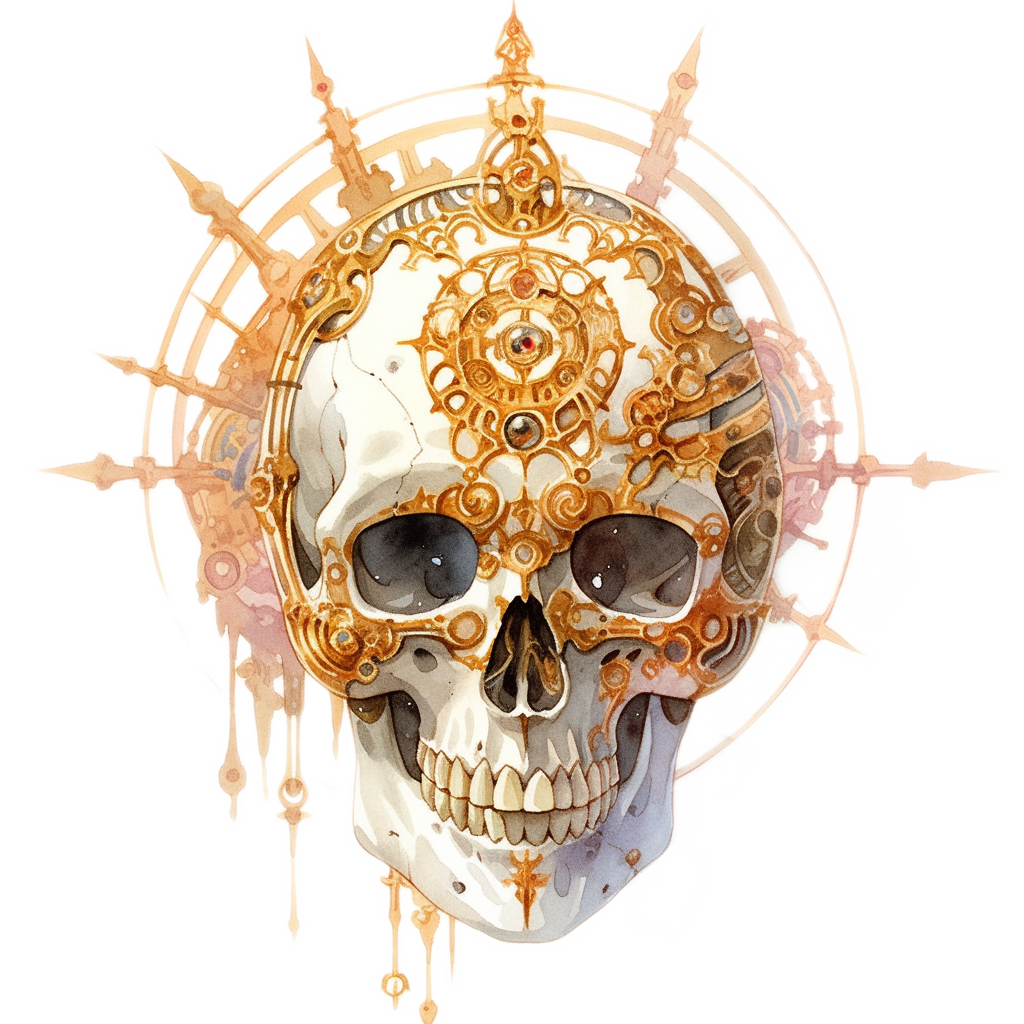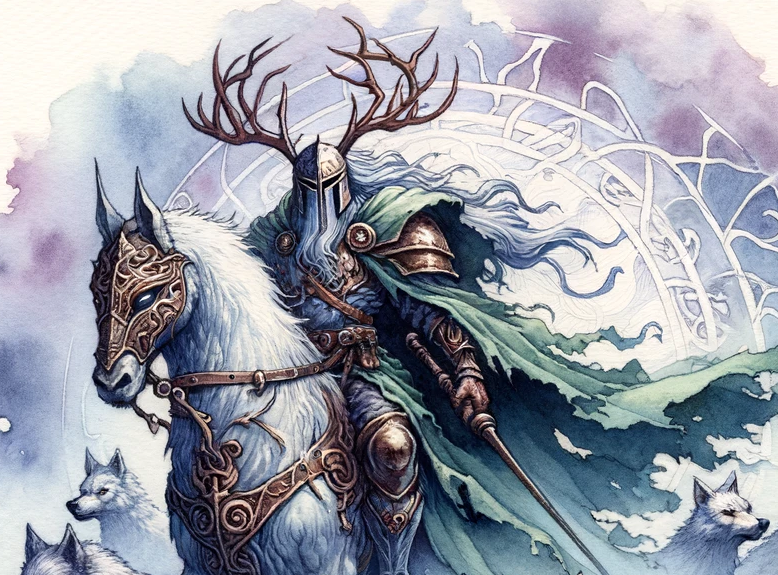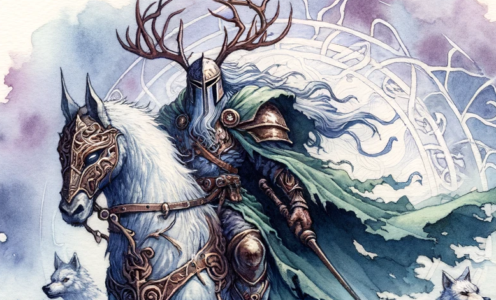The Wild Hunt
Part the First: The Hunt in History and Myth
The Wild Hunt is often associated with the Celtic pantheon and their collective realm, Tir na Og. In the stories of planewalkers, it is a force of good that the Celtic gods use to chase evil beings from their lands. It is said to be a great pack of wolflike hunting hounds, led by a great huntsman with an antlered helmet. But there are other tales of the Wild Hunt, from other cultures. In some primes, the Hunt is known as a force of evil, the huntsmen being death gods who lost their worship, but did not die, joining the hunt to take out their anger on the world. In such places, the hunt is said to be lead by a great monster of a man, with antlers growing from his head, and the hounds of the Hunt are great beasts with eyes of fire, whipped on by the huntsmen.
So which is the Hunt? A force of good or of evil? Is it exclusively a Celtic phenomenon, and have enemies of Celtic cultures created stories of the evil Hunt as propaganda? Or have the Celtic gods—especially Cernunnos—allied themselves with a force of evil, to better hunt other evil? The true answer is: none of the above. The Wild Hunt is neither good nor evil. It is purest neutral, indeed representing the force of the hunt and chase within nature.
Part the Second: The True Nature of the Hunt
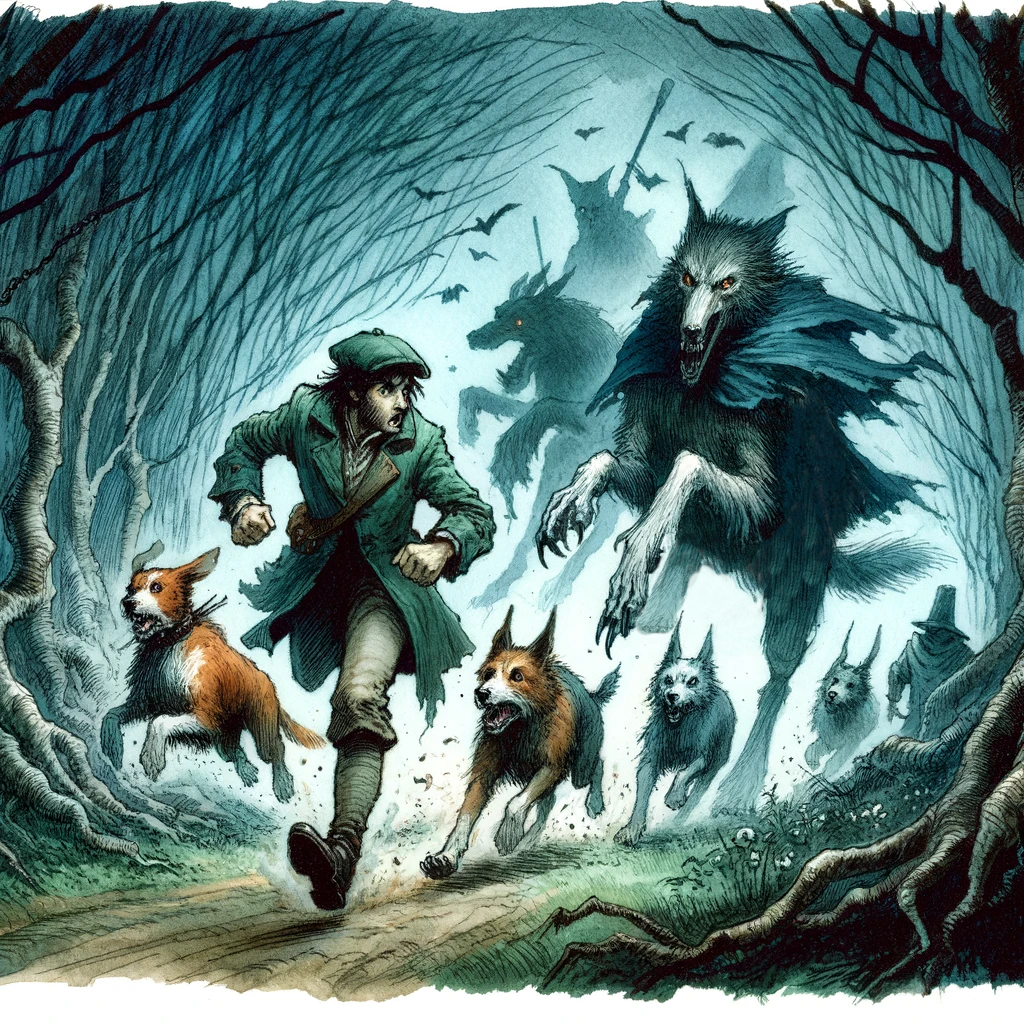
The Wild Hunt exists for the chase. It is capable of following its prey through any environment, from the densest jungles, to the deepest deserts, even across the sea, or into the airless reaches of space. The Hunt is tireless, hounding prey until they catch it. And the hounds of the Hunt seem to never lose the scent, being able to track over solid stone, or running water, or any other substance. Indeed, the hounds are capable of tracking even beings that should not leave a scent, like spectres or beings of energy. (1)
The Hunt usually does not leave its home on the Outlands. For it to go elsewhere, it must be summoned. To summon it, a powerful connection with nature is very helpful. This is why the Celtic powers so often use the Hunt; they are very in tune with nature, and find it particularly easy to call on it. Other pantheons also summon the Hunt, although much more rarely.
Powerful mortal spellcasters can also summon the Hunt. Wizards use a very potent spell to do so, on the level of wish or prismatic sphere (2). Priests can also summon the Hunt, although they must be granted one of the powerful magics known as quest spells by their god to do so (3).
Once a being is being tracked by the Hunt, it immediately feels a terrible supernatural fear. A being so pursued usually thinks only of fleeing in terror, regardless of whether it knows what is after it. It takes a very powerful will to resist this. The Wild Hunt can always travel just slightly faster than its prey is going, allowing it to reach its quarry in two to eight days. Of course, often the Hunt is told to simply chase a being, not catch it, so it will nearly catch up to the prey, then slow slightly so that the prey can keep just far enough ahead.
The Hunt is almost impossible to shake off. The Hunt can follow the trail of its quarry through any medium, including vacuum. Any normal form of spatial travel is completely useless in losing the Hunt. The only known way to lose the Hunt is to shift planes, and even this is not guaranteed to be effective.
Part the Third: The Stalking Grounds, the Lands of the Hunt
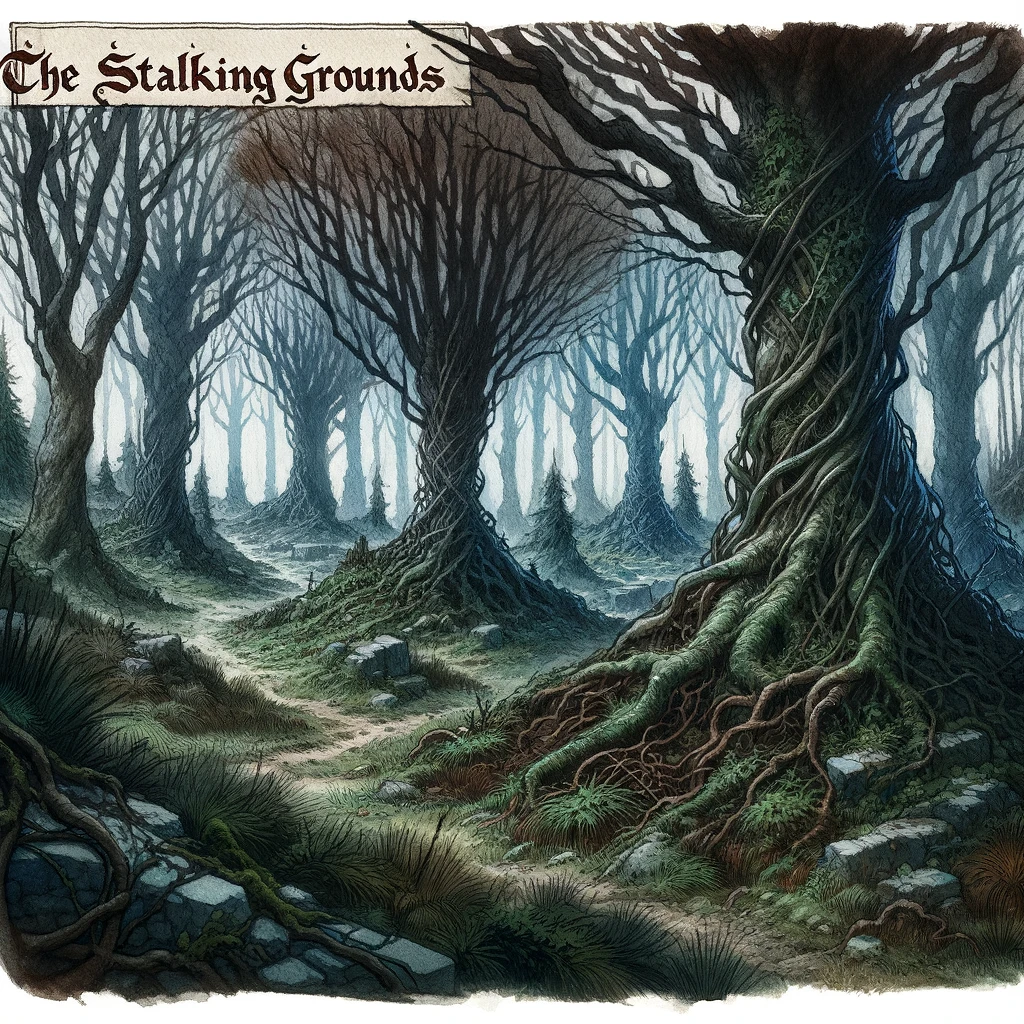
The Wild Hunt lives in the Outlands, in a forested realm near Tir Na Og. The land is differentiated from the realm of the Celtic powers by the density and unsettled nature of the forest there. Even in the deepest regions of Tir Na Og, the trees do not grow as closely, or the underbrush as tangled, as in the Stalking Ground.
The Stalking Ground is an area dedicated to the hunt and kill. The Wild Hunt roams through the woods, tracking anything that strikes their fancy. Often, the hunt breaks up into smaller groups that each hunt alone. The Stalking Grounds seem, to the casual traveller, to be relatively small. They can be traversed in only a day or two. However, travellers in the Stalking Grounds risk a dreadful danger. Any being within the Wild Hunt’s territory is considered fair prey. If the Hunt decides to go after a person (4), the Stalking Ground suddenly becomes much bigger. The person pursued suffers all the effects of anyone pursued by the Hunt. They immediately try to run as far and as fast as they can. People trying to reach the edge of the Stalking Grounds, however, are in for a nasty surprise. While they are being pursued, the region seems to go on forever.
No being has ever told of reaching the border while they were being hunted. Usually, the Hunt will pursue for a few days (5), then give up, if they have not caught their prey. After they stop hunting a person, he or she can once again find the border without difficulty. However, a far different fate awaits those who the Hunt catches. Usually, prey run to ground is torn apart by dogs, or killed by the huntsmen.
This, however, is not the end for the unfortunates caught by the Hunt. On the dawning of the next day, they rise again, fully healed of all wounds and weariness. In fact, they have even more than they started with, for they are now completely capable of taking care of themselves in the wilderness of the Stalking Grounds. But there is a great drawback to this “miracle”: people caught and killed by the Hunt can no longer leave the Stalking Grounds. To them, it is infinite in scope. They may wander as long as they will, but they will never find the end. They may not be hunted all the time, but every being in the Stalking Grounds runs the risk of being hunted, and slain by the Hunt again. Not even powerful magics such as wish are able to remove a person from Hunt’s domain. To date, prayers to the Powers have been ineffective, or at least unanswered. It is unknown whether the Powers are prevented from interfering with the Hunt, or whether they simply do not wish to.
An interesting fact is that the Hunt never seems to leave the Stalking Grounds, even when they have been summoned. They seem to have the ability to endlessly duplicate themselves, going to all the various planes to which they are summoned, and still staying within their land.
Notes:
1: Statistics of the Hunt [2e stats]
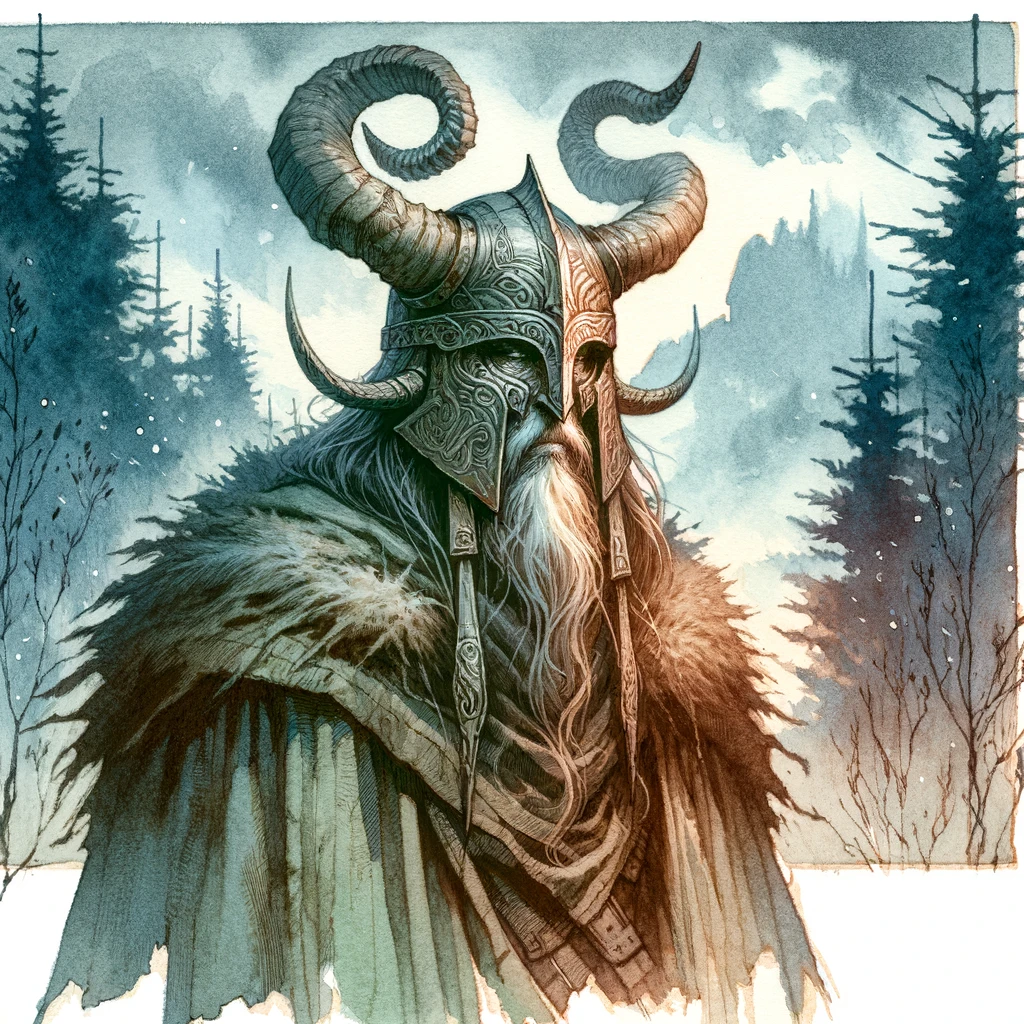
The Master of the Hunt
The Master of the Hunt is a tall man, wearing a great grey cloak. Sometimes he is described as wearing a helm with antlers, and sometimes he is described as actually having antlers on his head. The Master rides a great grey horse, of uncertain gender. Its eyes seem to glow with green flames, and sparks are struck from its hooves. The Master carries a great spear, as well as a short bow, with a quiver of hunting arrows that never seems to be exhausted.
Fighter 20, Str 19, Dex 16, Con 18, Int 9, Wis 10, Cha 15
AL N, AC 2, MR 50%, MV 12, HP 100, THAC0 1, #Att 2
Dmg 1d8/1d8 (spear) +6 or 1d6/1d6 (short bow)
Special Attacks: None
Special Defences: Regenerates 2d6 hit points a round, while fighting the prey of the Hunt.
Huntsmen
The Huntsmen are shadowy beings, of varied race and gender, who follow the Master. They wear black, grey, or white cloaks, and ride horses the same colour as their clothes. They are a variety of classes, but all can attack with spear or short bow. Usually, this is what they will use. However, if attacked by something more formidable, huntsmen capable of casting spells will do so.
Fighter 15+ (60%); Wizard 18+ (30%); Priest (usually speciality priest of nature deity, or druid) 18+ (8%); Bard 15+ (1%); Other class 15+ (1%)
Str 15-18, Dex 15-18, Con 15-18, Int 3-18, Wis 3-18, Cha 3-18
AL Any, AC 4-2, MR 10%, MV 12, HP 50-100, THAC0 5-1, #Att 2
Dmg 1d8/1d8 (spear) +6 or 1d6/1d6 (short bow)
Special Attacks: Any permitted to class (eg. Spells), although they will be used only rarely.
Special Defences: Regenerate 2d4 hit points a round, while fighting the prey of the Hunt.
The Hounds of the Hunt
The Hounds are a great pack of wolflike dogs, whose eyes and tongues burn with a greenish fire. It is very difficult to count them, but there may be anywhere from 200-2000 (20d10*10) with any one Hunt.
AL N, AC 5, MR 10%, MV 15, HD: 10, THAC0 10, #Att 3
Dmg 1d6/1d6/1d8
Special Attacks: None
Special Defences: Regenerate 1d4 hit points a round, while fighting the prey of the Hunt.
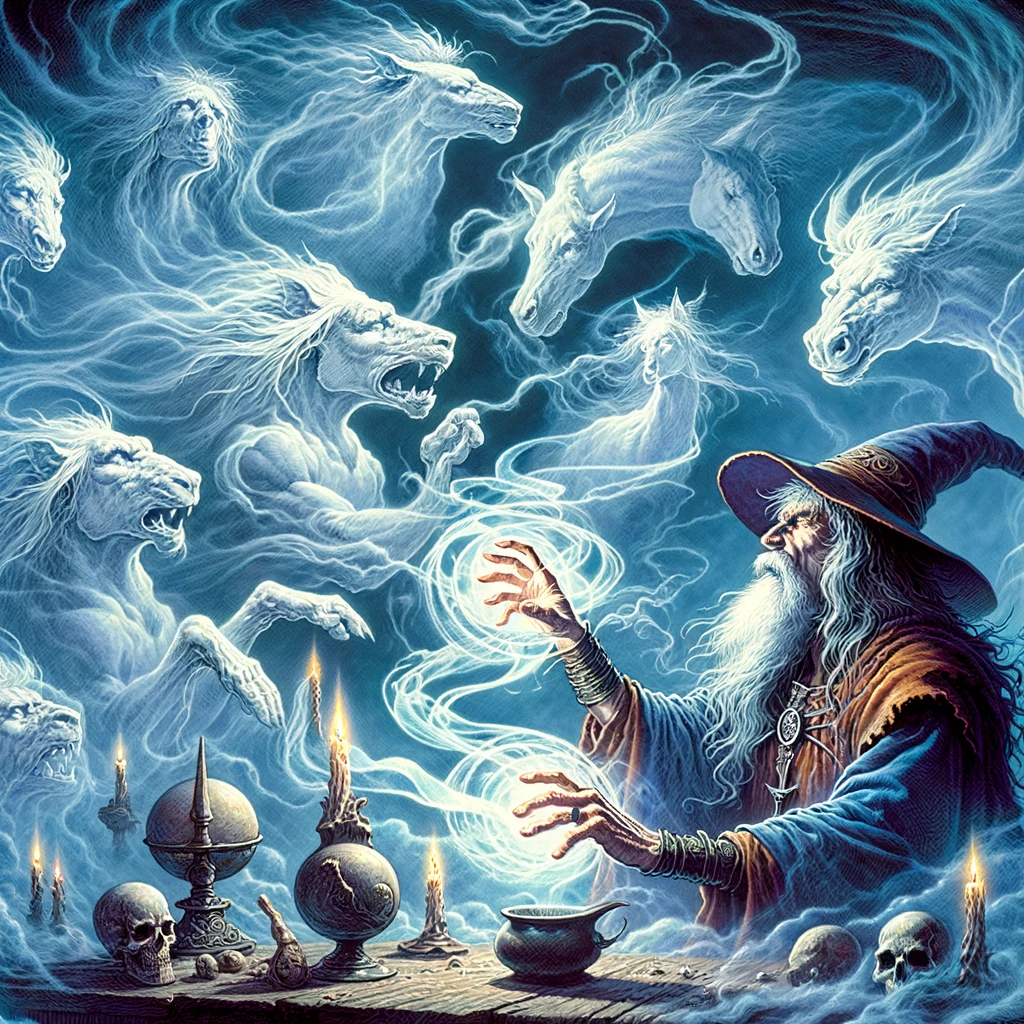
2: Spell: Call the Wild Hunt
Level: 9
School: Conjuration/Summoning
Range: Special
Components: V, S, M
Area of Effect: Special
Casting Time: 1 hour
Duration: Special
Saving Throw: Special
This spell allows the caster to summon the Wild Hunt to hunt down another being. This spell is very dangerous for the caster, as well as being uncertain in effect. When the caster completes the spell, the Wild Hunt arrives in 1d4 rounds. When the Hunt arrives, the caster must make a charisma check. If it succeeds, the caster has convinced the Master of the Hunt that the target of the spell is worth the effort of hunting. If the check fails, the caster must make a second charisma check. If it succeeds, the Hunt simply disappears, returning to its home. If it fails, the caster has angered the Master, and the caster becomes the object of the Hunt, immediately succumbing to all the affects. There are some bonuses to the initial charisma check. First, if the enemy to be hunted has harmed nature, there is a +1 to +5 bonus, depending on the severity and scope of the harm. Second, if the target has harmed the caster irreparably, there is a +3 bonus. Other bonuses or penalties may apply at the DM’s discretion.
If the Master accepts the hunt, the Wild Hunt must next attempt to pick up the scent of its prey. This takes 2d4 hours. To pick up the scent, the Hunt must have been summoned within 30 miles of a place the target has been before. Even if the Hunt sets out to track the target, the hunt is still uncertain. There is a 15% chance that the Hunt becomes distracted by some other being while it is attempting to pick up the scent of the prey. In this case, it chases some random being for 2d4 days, then returns to the Stalking Grounds.
If the Hunt is not distracted, then it picks up the scent. When this happens, the target, wherever he or she is, must make a save vs. spells at -6. If the save fails, the quarry is stricken by a magical fear. The quarry has no other desire but to flee the Hunt, which he or she knows is pursuing. If the first save is successful, the quarry has no idea the Hunt is on his or her scent until they are actually seen, at which time another save at -6 must be made, with identical results if it fails. If a prey fails a saving throw, and runs in fear, then they are entitled to another save once per day, with no modifiers. If they succeed, they can stop running, and do whatever they want to. Most keep running. If they fail, they are still affected by the fear.
The Hunt always takes 2d4 days to reach the quarry. However fast the quarry moves, the Hunt moves a little faster. Once they sight their prey, their actions depend on the orders of the spellcaster who summoned them. If they were commanded to simply pursue, they will chase the being until they reach the boundary the caster set. Often, this is the crystal shell of a Prime, but it can be other borders as well. If they have been commanded to destroy their prey, on the other hand, they will attack, using all the ferocity at their command. They will not rest until the prey is destroyed. If all the hounds, huntsmen, and the Master are killed (unlikely at best!), then the Hunt will return to the place they were destroyed in one hour, completely regenerated, and continue the chase. If they kill their quarry, then they disappear, returning to their place on the Outlands.
There is only one known way of losing the Hunt. The quarry must change planes. If they do so, they can make a save vs. spells, with a -2 penalty. If it succeeds, the Hunt is thrown off the scent, and returns to the Outlands. If it fails, the Hunt is able to continue tracking the creature. The Hunt will search about the area the quarry disappeared for 1d4 hours, and then will shift planes en masse to the quarry’s point of arrival on the other plane. Note that leaving a crystal sphere does not count as changing planes. Also note that while pursued by the Hunt, a being cannot enter Sigil. The Lady of Pain does not want the Hunt tearing through the streets, and bans entry to the Hunt and its prey. All portals to Sigil do not function for a being pursued by the Hunt. Finally, note that while affected by the fear effect, a wizard cannot cast spells. Thus, various planeshifting spells are not castable until after the wizard shakes off the effect. However, being told that changing planes is a way of losing the Hunt grants the wizard an immediate saving throw to shake off the fear.
The material components of this spell are complex. The wizard must have a gold and silver hunting horn worth at least 10000 gp. A platinum scroll, worth another 10000 gp, with the list of things the target has done to make him or her worth hunting, must also be procured. A horse of perfect quality must be found. If the caster is evil, the horse must be black. If the caster is good, the horse must be white. If the caster is neutral, the horse must be grey. In all three cases, every hair on the horse’s body must be that colour. No other colour can be found, or the spell will fail. Finally, the caster must be wearing a hunting cloak, worth ten times the normal price for a cloak, the colour of the horse.
To cast the spell, the wizard reads the list of things the target has done, then launches into a long speech as to why the target should be either hounded out of a certain region, or why the target should be hunted to his or her death. At the end of the hour, the caster must blow a hunting call on the horn. To do so, the caster must have the musical instrument proficiency necessary to play the horn. Within 1d4 rounds, the Hunt arrives. If the caster convinces the Master to go after the target, the Master will then offer to let the caster accompany them. He or she then has a choice as to what to do. If the caster chooses not to accompany the Hunt, nothing bad happens. The Master asks for the hunting horn, which the caster must give to him, and an indistinct figure, wrapped in the cloak the caster supplied, appears on the back of the steed. Then, the whole Hunt rides off, trying to find the target’s scent. However, if the caster chooses to join the hunt, there are a few benefits. First, there is only a 5% chance that the Hunt becomes distracted. Secondly, the Hunt only takes 1d4 days to track down the target. Finally, all of the target’s saves are made at a further -2 penalty.
There are dangers associated with riding with the Hunt, however. When the Hunt is over, the caster must make a save vs. spell, at -2. If the caster fails, then he or she disappears along with the hunt, to ride with them on their eternal hunt. If the first saving throw fails, there is a 75% chance that the caster returns to his or her world 5d4 years later, much changed. If he or she does not return within this time, then they will never return. If the caster dies while on the track of the target, he or she returns with the rest of the Hunt when they take up the chase. However, if this happens, the caster must save vs. spells at -8 at the end of the chase, or go with the Hunt. There are some benefits to riding with the Hunt as well. Regardless of whether the wizard goes with the Hunt after the chase or not, he or she gains some knowledge of hunting and hunting weapons. The caster gains the non-weapon proficiencies of Riding, Land-based, Animal Lore, and Tracking, and the weapon proficiencies of Short Bow and Spear. These proficiencies take up no extra slots, and have no restrictions on their use.
3: Spell: Call the Wild Hunt
Level: Quest Spell
Sphere: Summoning, Animal
School: Conjuration/Summoning
Range: Special
Components: V
Area of Effect: Special
Casting Time: 5 rounds
Duration: Special
Saving Throw: Special
This spell is identical to the wizard spell, except for the following differences.
- The caster does not need to make any charisma check to get the Wild Hunt to chase the prey. It is assumed that if the spell was granted by the caster’s power, the caster has a good reason.
- There is only a 5% chance of the Wild Hunt becoming distracted while trying to gain the prey’s scent.
- The target automatically fails his or her first save vs. the magical fear. All other saves are made at a -2 penalty, in addition to any other penalty.
- When changing planes in order to lose the Wild Hunt, the target must save vs. spells at a -4 penalty, instead of -2.
- No material components are normally required to summon the Hunt. To summon the Hunt, the priest must simply describe the reason for summoning, and then call on the power granting the spell to summon the Hunt.
- The priest is not asked or required to join the Hunt. The priest may, but only if the god allows it. If the priest wishes to join the hunt, the horse, cloak, and horn must be provided, as per the wizard spell. If the priest joins the hunt, he or she is subject to the danger of being carried along. A priest who joins the Hunt also gains the proficiencies, as described in the wizard spell.
4: 1% chance per day spent in the Stalking Grounds.
5: 1d6 days, usually.
Source: Kelly Pedersen, ‘the Sage of Everything’
